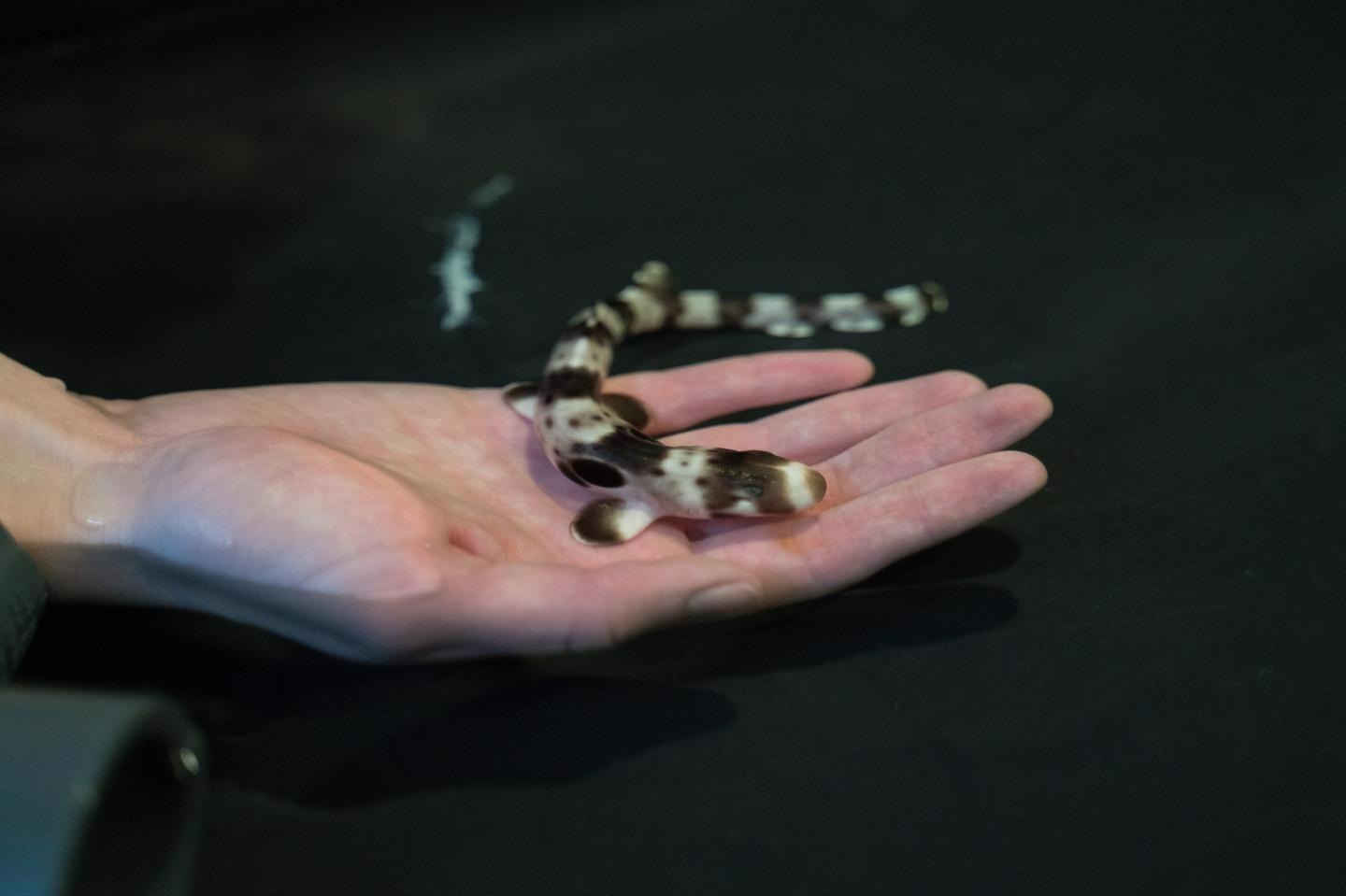Jan 13 2021
New research by the New England Aquarium reveals that the warming of oceans due to climate change has made baby sharks be born smaller, exhausted, malnourished, and into environments already hard for them to thrive in.
 A researcher handles an epaulette shark pup. Image Credit: E.Moothart.
A researcher handles an epaulette shark pup. Image Credit: E.Moothart.
As part of a study reported recently in the Scientific Reports journal, study lead author Carolyn Wheeler, a PhD candidate from the University of Massachusetts Boston and at the ARC Centre of Excellence for Coral Reef Studies at James Cook University, analyzed the impacts of elevated temperatures on the development, growth, and physiological performance of epaulette sharks—an egg-laying species that live only on the Great Barrier Reef.
Wheeler investigated embryos and hatchlings of the sharks, under the guidance of Dr John Mandelman, Vice President and Chief Scientist of the Anderson Cabot Center for Ocean Life at the New England Aquarium.
We found that the hotter the conditions, the faster everything happened, which could be a problem for the sharks. The embryos grew faster and used their yolk sac quicker, which is their only source of food as they develop in the egg case. This led to them hatching earlier than usual.
Carolyn Wheeler, PhD Candidate and Study Lead Author, University of Massachusetts
The hatchlings were not only smaller but were also in need of feed almost immediately and lacked in energy considerably, added Wheeler.
The ocean faces increasing threats from humans, such as the effects of climate change, and it is vital to conduct scientific research to help strengthen the management and protection of those ocean species most negatively impacted and vulnerable. In this case, we addressed a pressing threat--ocean warming--and the potential impacts on a species that could serve as a model for other egg laying species among sharks and their relatives.
Dr John Mandelman, Vice President and Chief Scientist, Anderson Cabot Center for Ocean Life, New England Aquarium
The Aquarium hosts a successful breeding program for epaulette sharks. This enables the team to make use of a few eggs to investigate the effects of climate change on a shark species native to the other side of the world. The study was housed at the Aquarium’s Animal Care Center in Quincy, Massachusetts as per directions from Barbara Bailey, Curator of Husbandry and Sustainability.
“This work included the efforts of staff, volunteers and interns across a number of departments. I was very excited to find a connection between the animals in our exhibits and the opportunity to contribute to an incredibly important scientific study,” stated Bailey.
According to Jodie Rummer, co-author of the study and associate professor, who is also Wheeler’s co-supervisor at James Cook University, the waters of the Great Barrier Reef will probably tend to experience summer averages approaching or even surpassing 31 °C/87.8 °F at the end of the century.
Sharks do not tend to care for their eggs from the time they are laid. This indicates that a shark egg should be capable of surviving unprotected for a period of four months. Rummer suggests increasing ocean temperatures as a significant concern for the future of sharks, especially for those that lay eggs.
The epaulette shark is known for its resilience to change, even to ocean acidification. So, if this species can't cope with warming waters, then how will other, less tolerant species fare?
Jodie Rummer, Study Co-Author and Associate Professor, James Cook University
Sharks and the family of animals to which they belong—including skates and rays—grow slowly. Moreover, reproduction is not so often in their case when compared to other fishes. The populations of several of these creatures are already endangered around the world.
The research indicates that in the future, sharks will be born—or hatched, in this instance—not only at a disadvantage but also into the warmest surroundings they can withstand.
Journal Reference:
Wheeler, C. R., et al. (2021) Future thermal regimes for epaulette sharks (Hemiscyllium ocellatum): growth and metabolic performance cease to be optimal. Scientific Reports. doi.org/10.1038/s41598-020-79953-0.